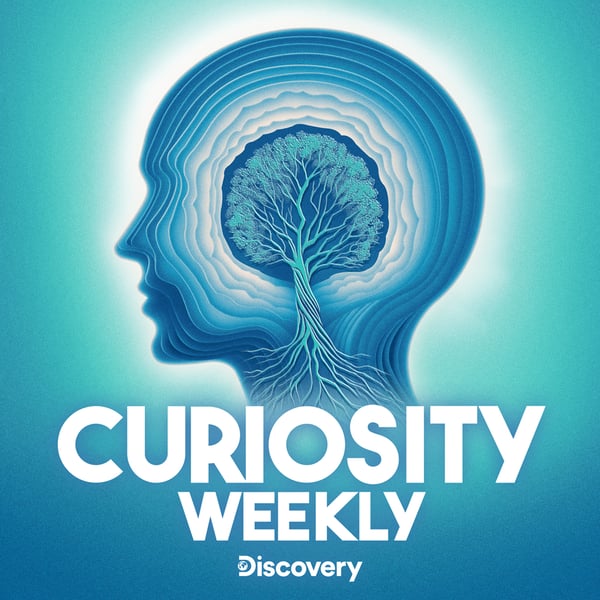Universal Donors, Exercise & Time, Eggshell Plastic
Curiosity Weekly
Warner Bros. Discovery
4.6 • 935 Ratings
🗓️ 27 June 2024
⏱️ 11 minutes
🧾️ Download transcript
Summary
Today, you’ll learn about a new way to turn certain blood types into universal blood types that could save countless lives, how exercise makes time slow down, and the new plastic made of eggshells that could clean up our water and stop plastic pollution.
Universal Donors
- “Bacterial enzyme strips away blood types to create universal donor blood.” by Paul McClure. 2024.
- “Blood safety and availability.” WHO. 2023.
- “Facts About Blood and Blood Types.” American Red Cross. 2024.
- “Akkermansia muciniphila exoglycosidases target extended blood group antigens to generate ABO-universal blood.” by Mathias Jensen, et al. 2024.
Exercise & Time
- “Time warps when you workout: Study confirms exercise slows our perception of time.” by Eric W. Dolan. 2024.
- “The perception of time is slowed in response to exercise, an effect not further compounded by competitors: behavioral implications for exercise and health.” by Andrew Mark Edwards, et al. 2024.
Eggshell Plastic
- “Researchers Develop Bioplastic From Eggshells as Sustainable Alternative to Plastic.” Technology Networks. 2024.
- “Eggshell incorporated agro-waste adsorbent pellets for sustainable orthophosphate capture from aqueous media.” by Bernd G. K. Steiger, et al. 2024.
- “Phosphorus and Water.” USGS. 2018.
Follow Curiosity Daily on your favorite podcast app to get smarter with Calli and Nate — for free! Still curious? Get exclusive science shows, nature documentaries, and more real-life entertainment on discovery+! Go to https://discoveryplus.com/curiosity to start your 7-day free trial. discovery+ is currently only available for US subscribers.
Hosted on Acast. See acast.com/privacy for more information.
Transcript
Click on a timestamp to play from that location
| 0:00.0 | Welcome to Curiosity Daily from Discovery, the very best place to get smarter in just a few minutes. My name is Nate. |
| 0:10.0 | And I'm Callie. We are so excited to have you here with us today at Curiosity. |
| 0:14.4 | And if you are one of our loyal listeners, welcome back. |
| 0:17.1 | Today you'll learn about a new way to turn certain blood types into universal blood types |
| 0:21.4 | that could save countless lives, |
| 0:23.3 | how exercise makes time slow down, |
| 0:26.2 | and the new plastic made of egg shells |
| 0:28.6 | that could clean up our water and stop plastic pollution. |
| 0:31.8 | Okay, I really agree with that working out one, |
| 0:34.2 | so let's find out. |
| 0:35.9 | Around the year 1900, a physician named Carl Landstiner |
| 0:39.4 | noticed that red blood cells would kind of clump together when mixed with the blood serum of different people. |
| 0:45.3 | It was a pretty curious observation and not long after he noticed that the blood serum of one person |
| 0:50.0 | would clump only with blood serum of certain other people but not with all blood. |
| 0:55.3 | Okay so this must be the discovery of blood types. |
| 0:58.0 | Bingo. |
| 0:59.0 | Dr. Landstiner made three categories and eventually a fourth would be added those would become the blood types we've all |
| 1:05.1 | known enough today a b a b and oh right so I know if you need a blood transfusion, you need to be given your own blood type, but I don't actually understand why. |
| 1:16.4 | I'm glad you brought it up because yeah, it's crucial that any blood you receive is compatible with your own blood. |
| 1:21.2 | You'll dig into the weeds of that premise in a second, but first, it goes without saying |
| 1:25.1 | that any potential blood shortage doctors face is often due to incompatibility. |
| 1:29.7 | Sometimes it's not that they don't have enough blood, It's that they don't have enough of the right blood. |
... |
Transcript will be available on the free plan in -270 days. Upgrade to see the full transcript now.
Disclaimer: The podcast and artwork embedded on this page are from Warner Bros. Discovery, and are the property of its owner and not affiliated with or endorsed by Tapesearch.
Generated transcripts are the property of Warner Bros. Discovery and are distributed freely under the Fair Use doctrine. Transcripts generated by Tapesearch are not guaranteed to be accurate.
Copyright © Tapesearch 2025.

